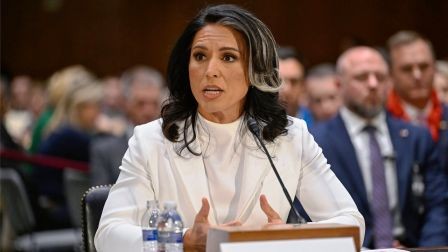On February 12, 2025, the Senate confirmed Tulsi Gabbard as the Director of National Intelligence (DNI) in a narrow 52-48 vote. This decision followed intense debates over her qualifications, past statements, and policy stances. As a former Democratic congresswoman and military veteran, Gabbard now oversees the nation’s 18 intelligence agencies, marking a significant moment in U.S. politics.
Background and Confirmation Process
President Trump’s nomination of Tulsi Gabbard sparked both support and opposition. Supporters praised her military service and independent thinking, while critics raised concerns about her limited experience in intelligence and past comments on foreign leaders. Notably, Republican Senator Mitch McConnell joined Democrats in opposing her confirmation, highlighting the divisive nature of her nomination.
The confirmation hearings were marked by rigorous scrutiny, with senators questioning her foreign policy views and readiness for the role. Despite the challenges, Gabbard secured enough votes to become the next DNI.
Key Points of Contention
During the hearings, several issues dominated the discussions:
- Foreign Policy Stance: Gabbard faced criticism for her past meetings with controversial leaders, including Syria’s Bashar al-Assad, and her comments on Russia.
- Intelligence Experience: Critics argued that her lack of direct experience in intelligence operations made her unfit for the role.
- Whistleblower Support: Her defense of Edward Snowden added to the controversy, with some senators questioning her commitment to national security protocols.
Tulsi Gabbard’s Vision as DNI
In her acceptance speech, Gabbard outlined her plans to reform the intelligence community. She emphasized the need for transparency, accountability, and rebuilding public trust. “Our intelligence agencies must serve the American people with integrity,” she stated. Gabbard also pledged to streamline operations and reduce personnel to improve efficiency.
Implications of the Confirmation
Gabbard’s appointment signals a shift in the administration’s approach to intelligence. Her leadership style and policy perspectives are expected to influence the direction of U.S. intelligence operations. While some view her confirmation as a step toward reform, others remain skeptical about her ability to navigate the complexities of the role.
Conclusion
The confirmation of Tulsi Gabbard as Director of National Intelligence is a historic moment. As she steps into this pivotal role, the nation will be watching closely to see how her leadership shapes the future of American intelligence.
Share your thoughts on Tulsi Gabbard’s confirmation in the comments below.
